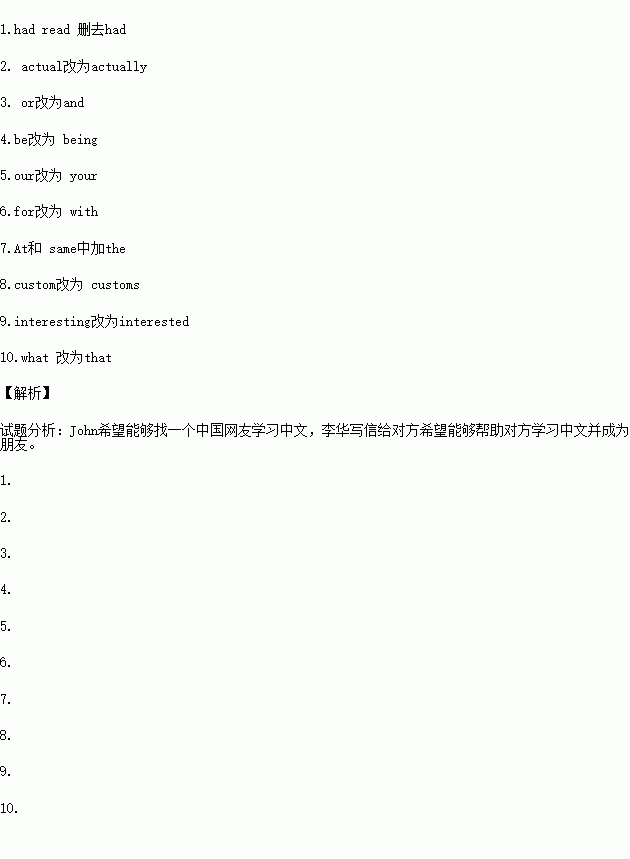题目内容
短文改错
假定英语课上老师要求同桌之间交换修改作文,请你修改你同桌写的以下作文。文中共有10处语言错误,每句中最多有两处。每处错误仅涉及一个单词的增加、删除或修改。
增加:在缺词处加一个漏字符号(∧),并在其下面写出该加的词。
删除:把多余的词用斜线(\)划掉。
修改:在错的词下划一横线,并在该词下面写出修改后的词。
注意:1. 每处错误及其修改均仅限一词;2. 只允许修改10处,多者(从11处起)不计分。
Dear John,
Yesterday I had read a notice on the Internet. You wanted to look for a Chinese friend online who can actual help you learn the Chinese language, cultures or customs.
I’m looking forward to be your friend on the Internet but I wonder whether or not you would like to accept me. If I become our friend on the Internet, I’ll try my best to help you for Chinese in my spare time. At same time, I’ll introduce some cultures and custom of China to you step by step.
So if you are interesting in this, please let me know your QQ number and I really expect what we can make good friends soon.
Love,
Li Hua
Modern life can be stressful. It’s full of pressure and hardships, worries and annoyances. But after years of being dosed up by doctors and seeking solutions on the self-help shelves, can most common complaints be cured through your next holiday?
The festival doctor will see you now.
Complaint | Prescription(处方) | Dosage(剂量) |
Guilty | Restart yourself at the Wanderlust Festival. | A weekend at any Wanderlust Festival should restrain some of the shame you are feeling. Empty your mind with meditation(冥想) sessions in the mountains of America or adjust your feelings with a sound bath in Santiago, Chile. |
Sad | A healthy dose of laughter at Just for Laughs in Montreal, Canada in July. | Have fun at the largest comedy festival, which attracts more than two million ha-ha hunters every summer. Apart from 250 comedy acts, there will be walkabout theatre, circus acts and lots of new comedy films to make you laugh to tears. |
Over- thinking | Get nourishing food for your thought at the UK’s How The Light Gets In in May. | Spend a week or so in the company of like-minded individuals and you will see you are not the only one overthinking things. The world’s largest philosophy festival, held in Hareous Wye, will have talks, debates and classes on culture, philosophy, politics, art and science. |
Heart- broken | Find one of your favourite fish in the sea at Ireland’s matchmaking festival in June. | A week at Liverpool’s matchmaking festival could be a choice as Ireland’s mythical matchmakers(媒人) have been pairing lovers together for centuries. Try to find Willie Dally, a fourth-generation matchmaker, for your best chance of everlasting love. Those who touch his lucky book are said to fall in love and marry within six months. |
1.When celebrating the festival Just for Laughs in Montreal, you will ________.
A. empty your mind with meditation sessions
B. be thrilled and your depression will be removed
C. burst into tears by watching comedy films
D. have discussions on the meaning of life
2.If you are thinking too much about work, you can spend a few days at ________.
A. the Wanderlust Festival
B. How The Light Gets In
C. Just For Laughs
D. Ireland’s matchmaking festival
3.According to the passage, we can learn the festival doctor specializes in ________.
A. treating people falling ill during festivals
B. listening to people’s complaints during festivals
C. offering a cure through the festival form
D. celebrating the festivals with the patients

